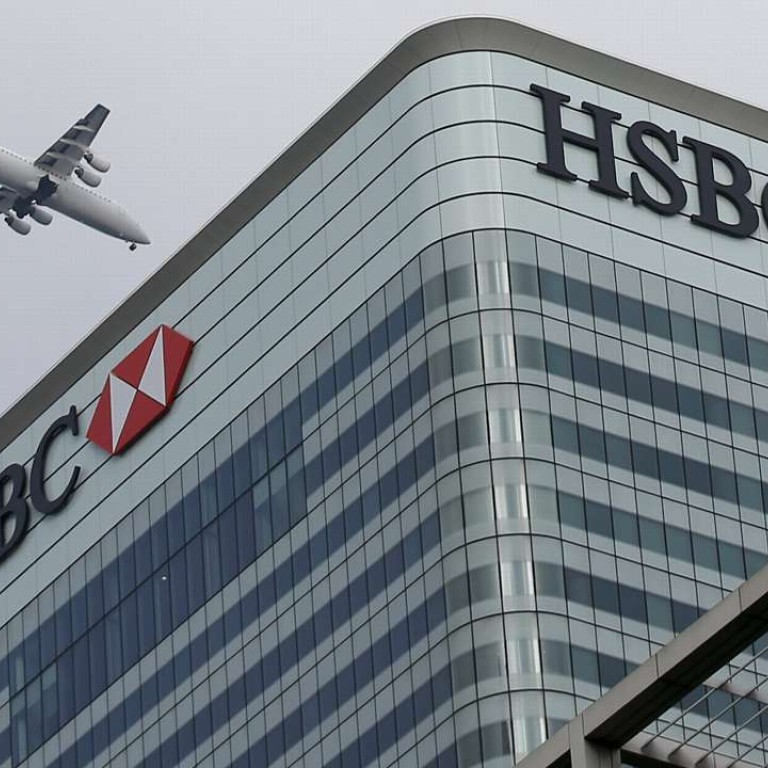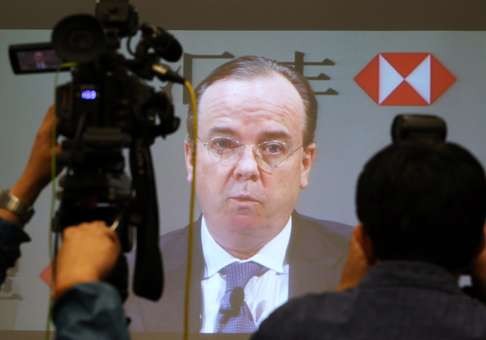
HSBC expected to announce sharp fall in revenue on Wednesday
Difficult economic conditions in China and the UK weigh heavily on Hong Kong’s largest lender
HSBC is expected to announce on Wednesday a 31 per cent decline in revenue for the first half of this year, according to estimates by Thomson Reuters, due to deteriorating economic conditions in Hong Kong and the UK, two of the bank’s main markets.
In a separate assessment by Moody’s, Sonny Hsu, vice president and senior analyst at the ratings agency, said he anticipates HSBC’s profits for the first half to be lower than the same period last year, in line with the overall economic environment.
“The situation is challenging for banks in both the UK and Hong Kong, two of HSBC’s main markets,” Hsu added.
Bank of America Merrill Lynch said in a research report that the sharp decline in pound sterling has created complications for HSBC. “The UK retail and commercial operations typically contribute three billion pounds in PBT [profit before tax] per year; these are now worth 16 per cent less in dollars than a year ago,” it said.
However, the report also noted, “The group has its headquarters and its capital markets in the UK, meaning its cost to income ratio improves as sterling falls.”
I don’t think I’d be surprised if banks were to report lower financial returns
HSBC’s subsidiary Hang Seng Bank will also announce its results on Wednesday, as will Standard Chartered, Hong Kong’s other Asia focussed but British headquartered bank.
The analysts consensus is that Standard Chartered’s revenue will fall by 20 per cent compared with the same period in 2015, according to Thomson Reuters data.
Last year, HSBC chief executive Stuart Gulliver announced a three-year strategy to reduce the bank’s wide-ranging international operations, cut annual costs by US$5 billion, and shed 50,000 jobs.
On July 1, HSBC completed the sale of its Brazil unit to Brazilian bank Banco Bradesco, and last week HSBC’s Middle East subsidiary said that it was conducting talks with a Lebanese bank about the possible sale of its banking business in that country. HSBC has also been looking to offload its loss-making Turkish business, but has so far failed to find a buyer.
HSBC’s strong performance in the first half of last year was driven by Asia, and Hong Kong in particular, as investors flocked to mainland Chinese markets.

Moody’s has a negative outlook for 14 out of the 17 Hong Kong listed banks.
“I don’t think I’d be surprised if banks were to report lower financial returns. Perhaps if the pace of decline was faster than what we expected then it might surprise us, but we don’t have high expectations,” said Hsu.
Meanwhile the UK, which accounts for a significant portion of HSBC’s activities, is still dealing with the fallout from the country’s vote to leave the European Union.
On July 28 Britain’s Lloyd’s banking group announced it would close 200 branches and axe 3,000 jobs in the UK.
“Investors are very nervous about the impact of Brexit and the health of the UK domestic banking business. We know in sterling terms that asset prices have come down around 15 per cent, putting a strain on loan books and activity,” said Brett McGonegal, chief executive of Capital Link International.
“Caution will be the prevailing tone as HSBC and Standard Chartered address Brexit and the future.”

